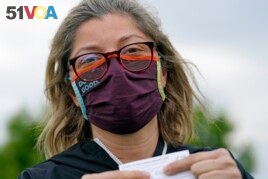24 April 2021
Rich people from Latin America have been traveling to the United States to get vaccinated against COVID-19.
Some are flying thousands of kilometers. Some are taking buses and cars. Some go straight from the airport to vaccination centers. They include politicians, business leaders and a professional soccer team.
Virginia Gónzalez and her husband flew from Monterrey, Mexico, to Houston, Texas. They took a bus to a vaccination center. Then, they made the 1,100 kilometer trip again for a second injection.
"It's a matter of survival," Gónzalez said. "In Mexico, officials didn't buy enough vaccines."
Mexico has a population of more than 130 million people. It has received more vaccine shots than many other Latin American countries—about 18 million injections. Most have gone to health care workers, people older than 60 and some teachers. Many Latin American countries are in the same situation.
To avoid the long wait, people who can pay for the trip are coming to the United States. More than half of American citizens have had at least one injection of a coronavirus vaccine.
Those who make the trip must first get a visa. They must also pay for coronavirus tests, air travel, hotel rooms and rental cars, among other things.
Earlier this month, 19 players on Monterrey's professional soccer team called Rayados traveled to Dallas to get the vaccine. Hernando De Soto, a presidential candidate in Peru, was criticized after he admitted to traveling to the U.S. for a vaccine.
Television stars have admitted on social media to getting a vaccine in the U.S., angering many people. Argentinian TV host Yanina Latorre, for example, traveled to Miami and posted a video on Instagram of her mother getting vaccinated. Shortly after that, Florida officials started requiring state residency to be vaccinated.
However, about half of U.S. states, including Texas, Arizona, and California, do not require residency.
Many of those traveling have friends or relatives who live in the U.S. and can help them get appointments. Some have second homes in the U.S. Others borrow a U.S. address.
Alejandra is a dentist who also lives in Monterrey, Mexico. She decided to get vaccinated in the U.S. soon after her mother died from COVID-19 in February. She signed up online at a CVS pharmacy in Texas by using the address of a friend who lives there.
She recognizes the criticism that foreigners like her are taking advantage of American taxpayers by getting vaccinated in the United States. But she said she is trying to protect herself and her family.

Alejandra poses with her vaccination card after getting her second Moderna COVID-19 shot Monday April 19, 2021, in Pasadena, Texas.
Drug stores are not asking for residency documents because they are vaccinating people for "the common good of society," she said. The government is paying for the vaccines and providing them to anyone who does not have health insurance.
Chris Van Deusen is a spokesman for the Texas Department of Health Services. He said the vaccine in Texas is "for people who live in, work in or spend" a lot of time in Texas. He added that more than 99 percent of people vaccinated were state residents.
The richest countries around the world have been able to receive the largest vaccine supplies. They have also been criticized for not doing more to help poorer countries.
Ernesto Ortiz is with Duke University's Global Health Innovation Center that measures distribution of vaccines around the world. He blames inequality for people traveling to other countries to get vaccinated. In Peru, for example, just two percent of the country's 32 million people have received a vaccine injection.
"I don't blame them at all," Ortiz said, "they are desperate."
I'm Mario Ritter Jr.
Olga R. Rodriguez and Marcos Martinez Chacon reported this story for The Associated Press. Dan Novak adapted it for VOA Learning English. Mario Ritter, Jr. was the editor.
__________________________________________________
Words in This Story
residency –n. the state or fact of living in a place
address –n. the words and numbers that are used to describe where a building or home is for mail, official purposes or directions
take advantage of –phrasal verb to use something in a way that helps you; to ask for or expect more than is fair or reasonable
insurance –n. an agreement in which a person makes a regular payments to a company in exchange for a promise to pay expenses related to the thing that is being insured
distribution-n. the act of giving or delivering something to people
desperate –adj. having a strong desire for something